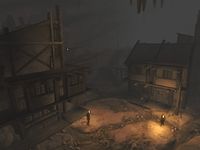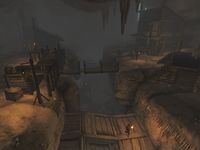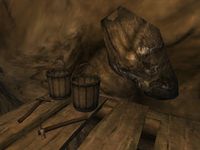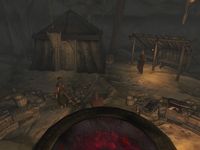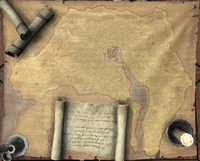Lore:Sundercliff
| Sundercliff | |
|---|---|
| Type | Settlement |
| Continent | Tamriel |
| Province | Cyrodiil |
| Region | Nibenay Basin |
| Appears in | Oblivion (Mehrunes' Razor), ESO |
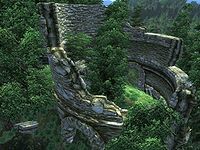
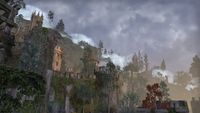
Sundercliff was a village located in Nibenay Basin,[1] east of Lake Canulus and west of the Valus Mountains making up the border between Cyrodiil and the eastern provinces of Morrowind and Black Marsh. It sits far away from any modern-day settlement, at a roughly equally far distance from Bravil, Cheydinhal, and Leyawiin, and contained ancient underground tunnels leading to Lake Canulus.[2]
It was originally the site of Varsa Baalim, an ancient Ayleid city.[3] The fort of Sundercliff Watch[2] (or Sundercliff Keep or Fort Sundercliff)[4] once rose over the village of Sundercliff. It served to defend the border with Morrowind and Black Marsh, but it was abandoned due to cutbacks during the Alliance War of 2E 582.[5] The village later fell into ruin, with the fort being all that remained of it by the Third Era.[2]
History[edit]
The ancient city of Varsa Baalim, which held the Mehrunes Razor, disappeared when the mountains of the Eastern Niben swallowed Varsa Baalim and the Nefarivigum with it. Whether it was caused by a final fallback plan of the Ayleids, a natural cataclysm, or the touch of the Divines is unknown.[3]
The village of Sundercliff was later built at the site of Varsa Baalim during the rule of the Reman Dynasty, serving as a waystation.[6] It also functioned as a garrison that defended the border between Cyrodiil and the eastern provinces of Morrowind and Black Marsh.[5] In 2E 581, the village of Sundercliff made a plea to the Kindly Contrivers of Clavicus Vile to have new farming implements before First Seed of 2E 582. The Biweekly Conclave of the Contrivers met to devise a response to the dilemma, and the proposal for new implements passed with majority vote, met with some jeering by its opposing voters.[1]
Circa 2E 582, Mehrunes Dagon was summoned to Tamriel by the mortal Sombren using the power of the Four Ambitions. A portal was opened between Sundercliff and Dagon's capital of Destruction's Solace in the Deadlands, resulting in the instant destruction of the fort and the surrounding town. Upon manifesting on Tamriel, Dagon began the process of merging his realm with Nirn using the power of the Ambitions. However, Dagon and Sombren were followed by a force of mortals and Daedra led by the Vestige, who interrupted the ritual. Another Ambition, Mairead, was able to steal power back from Sombren and used Dagon's egonymic to bind and weaken the Prince. With the help of the Vestige, Dagon's physical form was destroyed and he was banished to the furthest corner of the Deadlands via the use of his egonymic. This reversed the attempted merging of the realms, mitigating the destruction that had been caused to Sundercliff and the surrounding landscape.[7]
By the end of the Third Era, Sundercliff Watch was long since faded into disrepair and been all but forgotten,[6] and the city of Varsa Baalim beneath remained hidden, entombed deep within the mountains, inhabited by the undead vampiric remnants of its populace. In 3E 433, a rogue Telvanni arch-mage named Frathen Drothan gathered many mercenaries to his cause and formed the Drothmeri Army, which marched into Cyrodiil and captured Sundercliff Watch, a now abandoned fort. The fort had deep iron mines that extended far underground, and Drothan used these to excavate the entrance to Varsa Baalim. Once it was uncovered, he ventured into the ruins of the city with a large detachment of mercenaries and magically sealed the entrance to deter assassins.[8][9]
The Hero of Kvatch, hearing rumors of Drothan's rebel army, entered Sundercliff Watch, fought through the Drothmeri Army, and broke the magical barrier preventing any from entering Varsa Baalim and claimed the Razor.[2]
Gallery[edit]
-
An iron deposit in Sundercliff Mines
-
A map of Cyrodiil circa 2E 582 with a marker where Sundercliff would be located
See Also[edit]
- For game-specific information, see the OblivionMR and Elder Scrolls Online
 articles.
articles.
References[edit]
- ^ a b Kindly Contrivers Notes
- ^ a b c d Unearthing Mehrunes Razor quest in the Mehrunes' Razor DLC for Oblivion
- ^ a b Treatise on Ayleidic Cities
- ^ Fort Sundercliff in ESO
- ^ a b Fort Sundercliff loading screen in ESO
- ^ a b Loading Screens
- ^ Ambition's End quest in ESO
- ^ Drothan's Journal — Frathen Drothan
- ^ An Undelivered Letter
